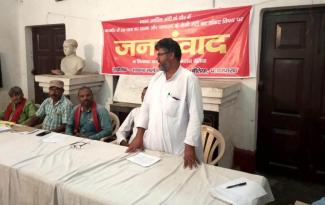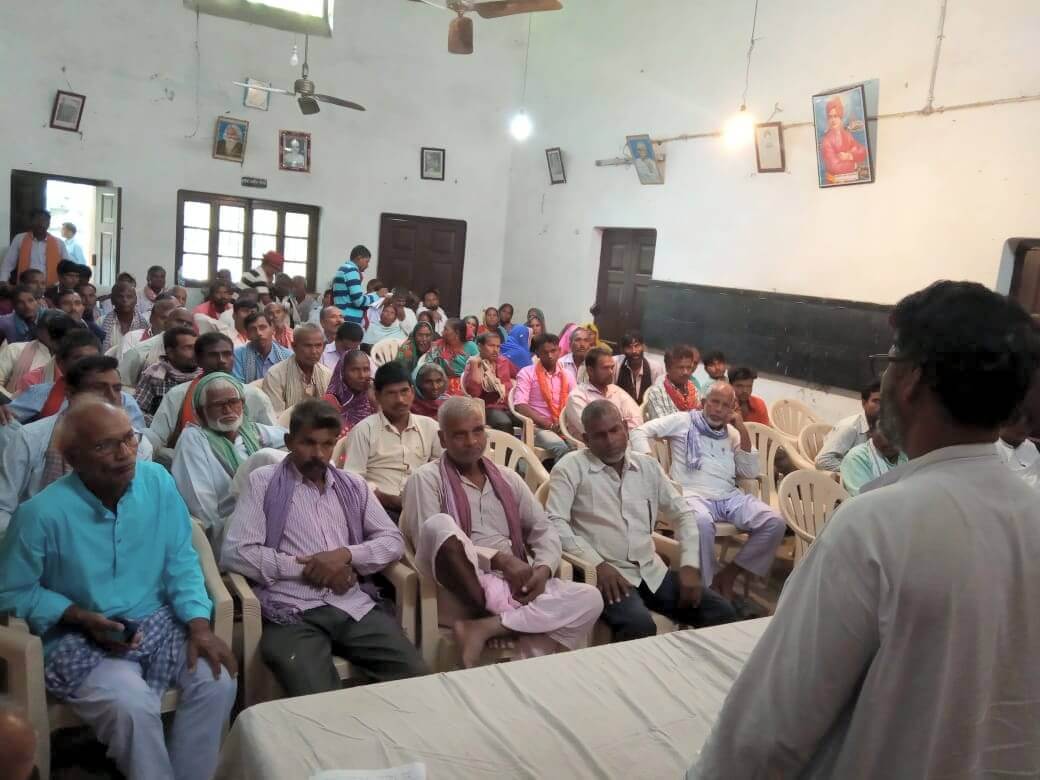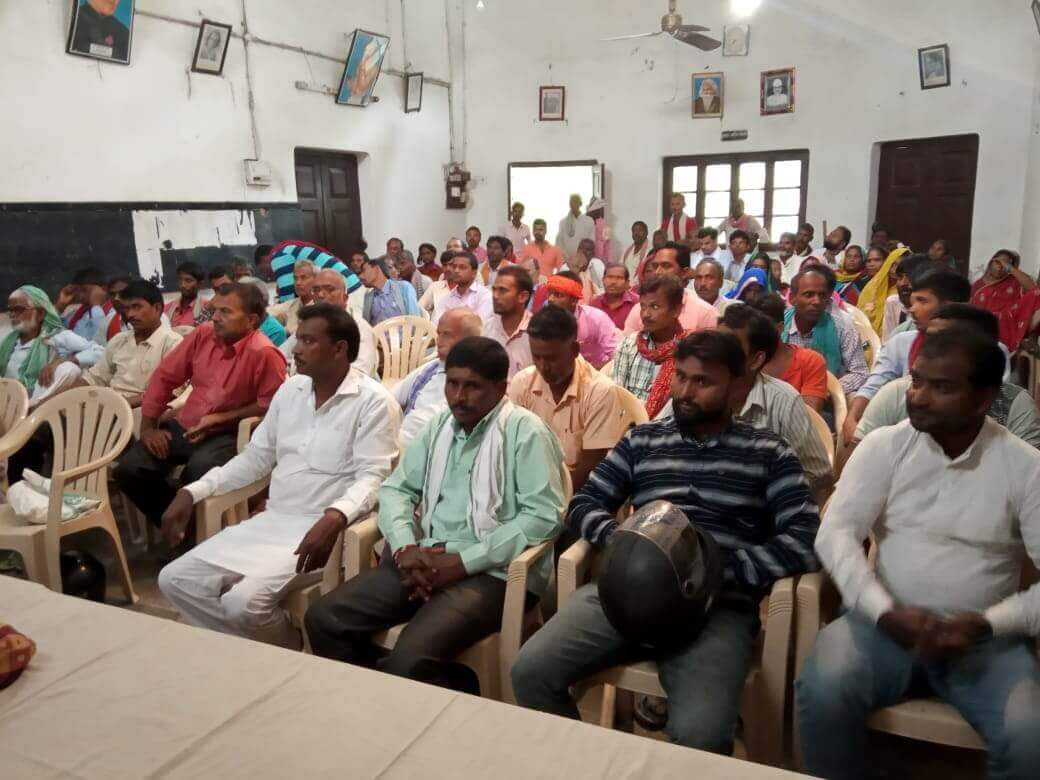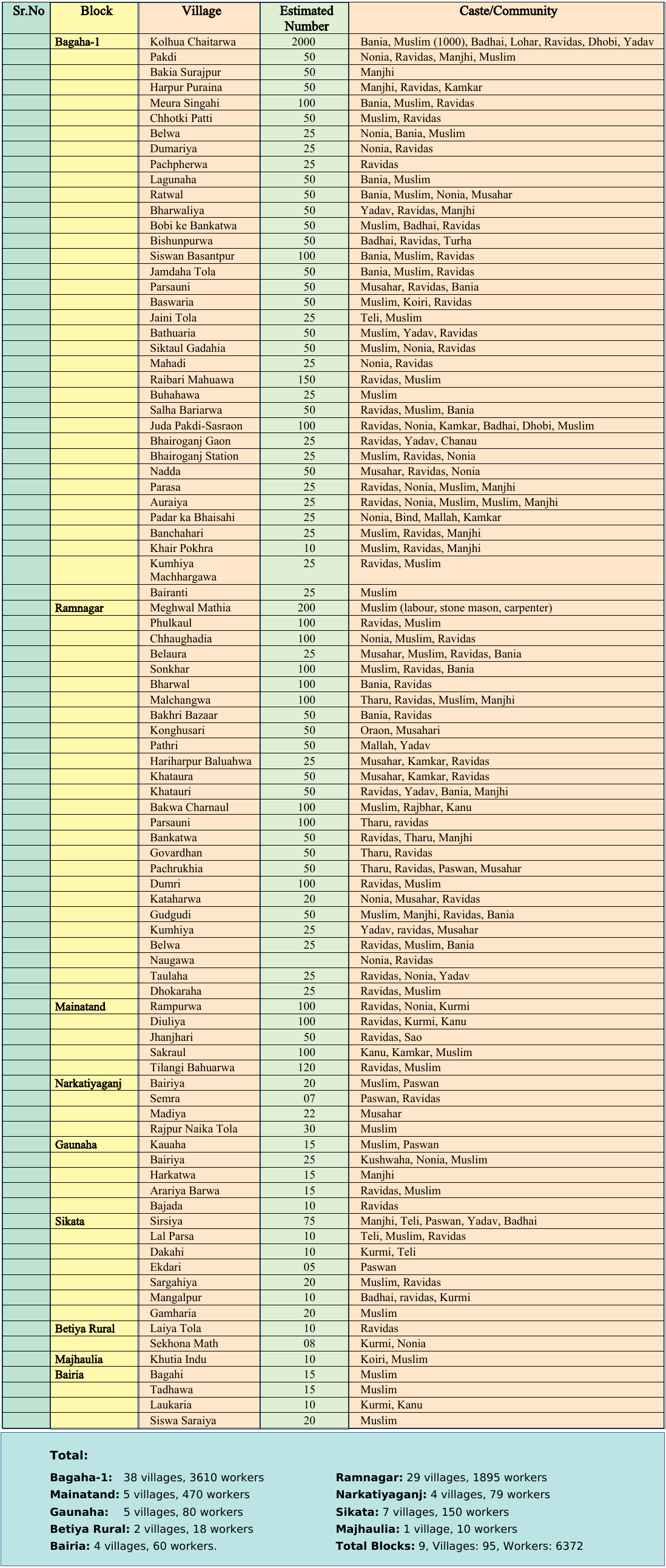
I was aware that as in the rest of Bihar, the poor of Western Champaran also migrate in search of livelihood; in fact, more people from here migrate than from other Districts. But what I did not know was that Kashmir is their preferred destination. There they get the opportunity to work with full trust and dignity. The local people treat migrant workers like welcome guests.
After the abrogation of Article 370 the poor of Champaran are opposing this step by the government, in part because crores of rupees of their hard-earned money remain in Kashmir as wages due to them. Army jawans have driven them out of Kashmir. They walked for 2 to 3 days, hungry and thirsty, to somehow reach the train station and come back to Bihar.
They have no complaints about the people of Kashmir, who never defaulted in paying their wages, but were unable to pay the workers as the banks were shut down. The workers have been forced home from Kashmir, and they have no money here. The BJP-JDU government in Bihar is not bothered about this distress of the poor. On the contrary, the BJP-RSS are busy running a vicious communal campaign dehumanising Kashmiris, and pointing out the supposed advantages of abrogation of 370! But the tens of thousands of people who have returned from Kashmir—who include people from all castes and communities—are unable to see these advantages. They find themselves looted and beaten and feel that the government has closed the door to one of their biggest livelihood opportunities.

A Jansamvad (People’s Dialogue) on the distress of workers forced to return from Kashmir was organized on 30 September 2019 under the joint banner of CPIML, AIARLA and AICCTU at the Maharaja College library in Champaran. We can listen to the pain of some of the workers in their own words.
Sarwan Ram/Jairam Patel (Rampurwa, Mainatand): We have returned from Pulwama with about 50 people including Khobhari Ram and Sanju Ram. All of us used to work in the ice-cream factory there and sell ice-cream. We never had any problem with the local people. We were beaten up, abused and insulted by the Army people and driven away from there. We walked for 3 days and reached the station. We could reach home only on the 6th day. Each worker has 15,000 rupees due to them in wages. Here we are struggling for even a single rupee. A total of Rs 7, 50,000 due to us remains trapped in Kashmir. Jitendra Mahto and Sanjiv Ram have Rs 30,000 and Rs 10,000 stuck there respectively. Sanjiv Ram had also broken his leg while working in the ice-cream factory.
Zainullah Khan (Kolhua Chaitarwa, Bagaha-1): The Amarnath Yatra was about to start, when we got the notice from the police that we should leave Kashmir. I had to leave Rs 3, 50,000 and flee from there. I used to work there as a tile-layer.
Naimullah Khan (Basantpur, Bagaha-1): We somehow fled from there, hungry and thirsty and fearing for our lives, and reached home after 5 days. All my things have been left behind there. There were 20 workers with me. All together Rs 3 lakhs remain due to us.
Ajay Mahto (Khap Tola, Nautan): We used to work there as stone masons. We had taken a contract to build a house. We had 10 workers and 6 masons with us. We had to flee from there with Rs 1 lakh owing to the masons and Rs 50, 000 owing to the workers.
Mohd Abdullah (Basantpur, Bagaha-1): We were working there for the past 6 years as tailors, and had no problems. Now our belongings and Rs 3 lakhs are trapped there.
Thag Ram (Laiya Tola, Betiya Rural): Two of us from the same family were working there. Rs 50, 000 are trapped there. 100 workers from our village have returned from Kashmir.
Zafar Imam (Siswa Basantpur, Bagaha-1): I used to work in Anantnag as a stone mason. There were 7 workers with me. Curfew was clamped down from 5 August. Rs 7,000 due to me are stuck there. We somehow saved our lives and fled from there without food or water. On returning home, we now face a starvation situation.
Bunilal Prasad (Sekhwana, Betiya Rural): Both of us, father and son, used to work in Kashmir as stone masons. Rs 1, 50, 000 due to us are stuck there.

These are the woes of some of the workers forced to return from Kashmir. 75 people have returned to Sirsiya, Sikata. Rs 2, 88, 000 due to just 13 people from the Musahar community remains trapped in Kashmir. Workers who sold their labour in the labour market on a daily basis did not lose their wages, but they are also angry as there is no work for them in Bihar and they have had to leave work there and return here. They used to be able to earn Rs 1.5 to 2 lakhs there.
From earning a comfortable and dignified living in Kashmir, these migrant workers have suddenly been forced to return to Bihar and face the brunt of the Modi-made economic crash in India! No wonder, they find it a cruel joke when they hear the BJP and the Modi regime argue that abrogation of 370 will bring ‘development’ to Kashmir! They are all clear that Kashmir is far better developed than Bihar, and had far better wages and working conditions to offer. They reject the dehumanisation of Kashmiris also, and are all praise for the humanity and kindness of their Kashmiri employers.
CPIML Western Champaran District Committee members told us that workers from Champaran used to do various kinds of work there—from hoeing apple and walnut orchards to harvesting paddy and mustard, as workers and stone masons in construction work, as carpenters, selling ice-cream, pan and gutkha, laying bricks, tailoring, mosaic polishing, laying tiles etc. Workers also go to Ladakh in large numbers to work there.
Workers from Rampurwa told us that people from our village sell ice-cream from April onwards and then from September we harvest paddy. About 2,000 workers from a single village (Kolhua Chaitarwa) in Bagaha-1 Block work in Kashmir. Comrade Ram Awadh Rai told us that his son Sudama Rai used to work in Katara, 50 km from Jammu. People work there as apple orchard workers, stone masons, and labour. The workers did not have any money when the police and army drove them all away. They walked for several kilometres without food or water to reach Katara, Udhampur and Jammu stations and board the trains back to Bihar. Comrade Ram Awadh told us that people in his village used to bring back Rs 5 to 6 crores annually as earnings. His estimate is that about Rs 50 lakhs due to the people of the village are trapped in Kashmir. The entire life in Kolhua Chaitarwa village is in a way based on Kashmir.
Currently it is festival time in Bihar: first Diwali, and then Chhath. These festivals entail expenses but people’s pockets are empty. Crisis looms over the month of Kartik for the poor. The Jansamvad program organized at the Maharaja College library was unanimous in its demand for immediate compensation for migrant workers forced to return from Kashmir, recovery of the money due to them, and alternative employment and livelihood arrangements for them. The CPIML has made plans for an agitation on these issues. Lists are being prepared of people who have returned from Kashmir. Reports have come from one village — Sirisiya, Sikata — where Rs 10, 74, 000 due to a total of 75 workers are stuck in Kashmir.
At the Jansamvad, workers also expressed concern at the terrible calamity forced on the people of Kashmir. They discussed the findings of solidarity teams that visited Kashmir, including the first team in which CPIML leader Kavita Krishnan had also participated. They said that the Modi government and the BJP-RSS want us to celebrate Kashmiris’ woes. But we can see that Kashmiris’ suffering and our own are tied together. The rural and urban poor in India must build solidarity and unity with the people of Kashmir – and must demand that the Government stop oppressing the people of Kashmir.
Despite all claims of development in Bihar, migration of workers from Bihar in search of livelihood is a regular phenomenon. This is also an important part of the State’s income. In Districts like Champaran where lands are under the capture of real estate barons and sugar mills, migration for livelihood becomes the only option for the poor. The government must guarantee the interests of migrant workers.
Activists working in various Blocks have given a preliminary report on migrant workers in Kashmir, which is in the tables below.

Liberation Archive
- 2001-2010
-
2011-2020
- 2011
- 2012
- 2013
- 2014
- 2015
- 2016
- 2017
- 2018
-
2019
- JANUARY-2019
- FEBRUARY-2019
- MARCH-2019
- APRIL-2019
- May-2019
- LIBERATION, JUNE 2019
- Liberation JULY 2019
- LIBERATION, August 2019
- Liberation, SEPTEMBER 2019
-
Liberation, OCTOBER 2019
- Lift India out of the Morass of Economic Recession
- What Kind of Oneness Do We Need?
- Crumbling Economy, Soaring Joblessness: Modi Made Economic Disaster
- Left Parties National Convention
- Jadavpur Fights Back: Powerful Student Resistance against Fascist Vandalism
- Stop Hindi Imposition: Resist BJP's Attacks On India's Diversity And Democracy
- NRC Final List And Its Aftermath: A Massive Humanitarian Crisis That India Must Avert
- Contested Citizenship in Assam: People's Tribunal on Constitutional Processes and Human Cost
- Bound and Gagged, Yet Kashmiris Make Modi Face Global Heat
- Abrogation of Article 370 In J&K Hits Bihar Migrant Workers Hard
- Yatra and Conference For Adivasi Rights
- AICCTU Workshop In Bhubaneshwar
- Jharkhand Gov Responds to Pathalgadi With Violence
- Left Sweeps 2019 JNUSU Elections: JNU Cannot Be 'Conquered'!
- AISA Emerges Stronger in DUSU
- Protests Against Eviction in Assam
- Adivasi Rally In Gujarat
- Deaths in Kushinagar District due to Malnutrition-Caused Illness
- Rasoiya Cooks Protest in Sitapur
- Mass Contact Drive in Tripura
- Dismal Job Situation In Bihar
- Red Salute to Comrade Sandhya Talware
- BHU Students Protest Sexual Harassment Again
- False FIR Slapped on Chhattisgarh Activists
- Liberation, NOVEMBER 2019
- Liberation, DECEMBER 2019
- 2020
- 2021-2030
Charu Bhawan, U-90, Shakarpur, Delhi 110092
Phone: +91-11-42785864 | Fax:+91-11-42785864 | +91 9717274961
E-mail: info@cpiml.org







